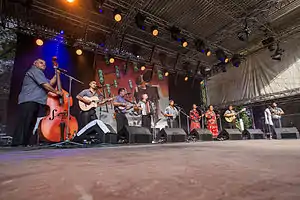Parno Graszt
Parno Graszt is a Roma (i.e. "Gypsy") music ensemble from Paszab, Hungary founded in 1987. "Parno Grast" means "white horse" in the Romany language,[1] with "graszt" using the Hungarian orthography 'sz' for 's'. In the Roma culture white is symbol of purity and horse is a symbol of freedom. Their debut album Hit the piano reached Number 7 on the World Music Chart Europe in October 2002.[2] Hungarian Television and the BBC produced in 2004 a music documentary about Parno Graszt.[3] After their second album, Járom az utam (2004), Parno Graszt was voted in the top 10 for "best artist of year", 2005, by the Swiss music magazine Vibrations.[4] In 2016, they competed in A Dal, the national final selection for Hungary in the Eurovision Song Contest with the song Már nem szédülök, and reached the final.
Parno Graszt | |
|---|---|
 Parno Graszt (2014) | |
| Background information | |
| Origin | Paszab, Hungary |
| Genres | Roma |
| Years active | 1987–present |
| Website | www |
Members
- József Oláh (vocals, guitar, tambura)
- Géza Balogh (vocals, guitar, dance)
- Viktor Oláh (vocals, guitar, dance)
- Sándor Horváth (vocals, spoons, dance)
- János Jakocska (vocals, guitar)
- Mária Váradi (vocals, dance)
- Mária Balogh (vocals, dance)
- Krisztián Oláh (accordion)
- János Oláh (double bass)
- István Németh (oral bass, churn)
Discography
- Rávágok a zongorára (2002) (Hit the Piano)
- Járom az utam (2004) (...In My World)
- Ez a világ nekem való (2007) (This World Is Made for Me)
- Reggelig mulatok (2011) (I Revel Till the Break of Dawn)[5]
